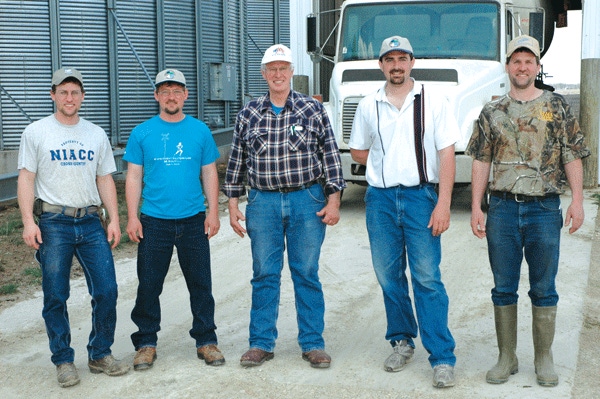Making a Hog Business ‘One Happy Family’
Farm majority owner Max Schmidt says the key is that everyone simply gets along with each other.
June 15, 2013

Every Friday morning, Max Schmidt rises early to prepare a big batch of scrambled eggs using two dozen eggs, cheese and locally processed pork sausage. There is fresh coffee cake or homemade rolls made by his wife, Georgia, and, of course, a fresh pot of coffee and orange juice. An extra 2 lb. of pork sausage is prepared to top it off.
It’s a meal fit for a king. But for the 70-year-old Elma, IA, pork producer, it’s his way of taking care of his family. Although the four young men crowded around the kitchen table aren’t his immediate family, they are his pork-producing family and all are partners-owners in KMAX Farms LLC.
Energized by a hearty meal, plenty of discussion and laughter, Schmidt and the young team set off to ship two loads of market hogs to an area packer.
Solid Relationship
It’s a good relationship that is built on mutual trust and respect, sharing duties and decision-making among the partners and Schmidt, says Duane Bodermann, a 20-year veteran and manager of pork production for the nursery-to-finishing operation. At age 43, he is the eldest of the employees-turned-partner group. He is in charge of the 6,000 nursery spaces scattered around a half-dozen sites.
Trent Thiele, 30, who joined the team in 2011, is manager of pork production for the 14,000 finishing spaces sited on a variety of locations near partner’s homes, where land adjoins Schmidt’s 3,600 acres of cropland. Siting was intentional to allow manure application locally, appeasing neighbors’ concerns about manure odors and tankers visible on rural roads, Schmidt says. There are eight permitted sites, all within a five-mile radius of the home farm.
Brian Haeflinger, 30, who started in 2008, manages the farm’s computer-automated feedmill, which is capable of producing up to 150 tons of feed daily. Normal operation is 70 tons of feed a day. The mill was built in 2009, when the local feedmill at Elma went out of business. Brian also helps load market hogs, power washes barns and performs other tasks as needed.
Jason Haeflinger, 30 (Brian’s twin), who started in 2005, handles daily chores at many production sites and assists where needed. Jason is also in charge of economic control, checking feeders daily. “Feed wastage is one of our biggest problems. You can’t afford to waste $300-a-ton feed,” Schmidt says.
Operation Evolution
Schmidt says all of the hogs, hog barns and land they sit on, and the feedmill are owned by KMAX Farms LLC, with shares purchased by the partners.
The seeds for development of the LLC were planted about 15 years ago, when Schmidt and Bodermann set up their first agreement. “We built this 800-sow unit together on land that Duane owned. He owned the land and I owned the barn,” Schmidt recalls. “It was based on a 10-year plan, which stipulated that in 10 years I was obligated to sell him the barn and he was obligated to buy it.”
By 2004-2005, when the transaction was to move forward, the hog market tanked and creditors indicated the deal wouldn’t cash-flow for Bodermann, Schmidt explains. So the pair “agreed to get along, because it was all we could do,” Bodermann adds.
“It was a good summer to get out of sows, which were selling for $63/cwt. Baby pigs were virtually worthless and lots of pigs were available for sale. We were buying weaned pigs for $3 [each],” Bodermann says. The sow herd — 800 sows housed inside and 450 housed outside — were all shipped to market.
About that time, Schmidt was serving as environmental committee chairman for the National Pork Board. On a committee trip to Canada, he got a firsthand look at some sow facilities with impressive productivity; few litters were less than 12-13 piglets.
Realizing that he couldn’t compete with the Canadians on sow productivity convinced him to stick to his farm’s strengths, and focus on nursery and finishing pig production.
Schmidt and his team currently buy 1,000-1,200 pigs a week from two sources on contract, one near Faribault, MN, and the other near Rockford, IA. Three-week-old pigs weighing 13 lb. are raised in half a dozen nurseries for six weeks, and then spend the next 18 weeks in the eight finishing barns. Pigs are marketed at 280-290 lb.
Some packers prefer heavy weights, Schmidt says. It also helps spread the cost of the $40-$45 weaned pigs and high-priced feed over more pounds of pork. �“When you can put an extra 20 lb. on that pig, you can buy fewer weaned pigs in a year’s time and still come out with the same amount of revenue,” he adds.
Roughly two-thirds of KMAX Farms’ pigs are sold on the open market; the remaining one-third are sold on contract.
“It is one of the problems that I see in the industry: Very, very few producers are on the open market. They all want a contract and don’t want to hassle with it. But I think it is necessary that somebody go out there and do the bidding to maintain the integrity of the hog market,” Schmidt says.
Passing on an Operation
“We all think when we get to retirement age, we can pass the farm on,” Schmidt observes. Speaking from experience, Schmidt says his father couldn’t let go of the family farm, although he kept talking about it. “Farmers just have a tough time of letting go of the land,” he explains.
So as aged, he decided to put together a succession plan. The problem was, neither of his twin sons, Leland or Roland (now 43), was interested in staying on the farm. Leland became a minister and Roland, a teacher. Both reside in Spirit Lake, IA.
Like what you’re reading? Subscribe to the National Hog Farmer Weekly Wrap Up newsletter and get the latest news delivered right to your inbox every week!
In the meantime, numerous employees have come and gone, and the only longtime employee remaining in the operation is Mary Starr, who is nearing retirement.
All four partners in KMAX Farms started as employees. Their rule is that employees must work at least one year before they can be considered to become a partner.
Senior partner Bodermann explains how the LLC actually works at KMAX Farms. “The LLC is a fixed number of shares, and the value of those shares can change. Max is obligated to sell shares to the partners-owners at the value of those shares down to 51% of the shares, which Max will always maintain, as is required by Farm Credit,” Bodermann explains.
“It gives these people the chance to become owners without the huge capital expense of starting their own operation,” Schmidt notes. Each partner is required to invest a minimum amount of capital. For most, that means borrowing money. But it ensures that everyone has “some skin in the game,” he adds.
“It is a good opportunity for us as younger farmers to get started because we are buying into an already-running operation with no startup fees,” Thiele adds. “Max has built up a lot of relationships with the hog buyers and the packing plants, and provides a lot of wisdom. He has made it through a lot of tough times.”
“This obviously puts the onus on everybody to do their part, make this operation work, and gives everybody the opportunity to help their families out in the long run,” Bodermann says.
The five-member team is able to spread out the risk of farming. And Schmidt says he is most proud of the fact that they get the job done without conflict. “We all get along and we recognize that that is important,” he says.
LLC and Corn
The LLC agreement also obligates any partner who produces corn to sell the grain to KMAX Farms. “My corn goes to the LLC, and the LLC can buy it on a weekly basis to match the elevator price locally,” Schmidt says. “The LLC can also take positions on the Chicago Board of Trade, just as I can take positions to shift my risk.”
A year ago, the LLC got hammered by a very poor corn crop in northern Iowa, plus competition from four nearby ethanol plants that reduced the available supply and ramped up local corn prices.
“That’s one of the synergies we have here as grain producers and livestock producers — we are taking money out of one pocket and putting it in the other,” Schmidt relates.
“Last fall, I sat here with a brand-new combine and half a corn crop,” he laments. “These guys asked, ‘How are we going to buy corn?’ and I said, ‘We’ve got to bid more than somebody else.’”
But Schmidt and partners devised a better plan. “We offered to harvest people’s corn for $22/acre, haul it to our mill for free, dry it free of charge and store it for free,” Schmidt explains. The catch, of course, was that the corn had to be sold to KMAX Farms by June 30.
The strategy worked. The farm picked up 100,000 bushels of corn. “It was taking something we had that didn’t cost us cash, in exchange for something of value that we didn’t have,” Schmidt says.
LLC and Manure
“Since the LLC is in the hog business, we regard the manure as extremely valuable. Not only does it have nutrients, it has micronutrients that you just can’t get commercially,” Bodermann remarks.
“The way it works, the LLC sells the manure to whoever in our group needs it, for 40% of the value of manure based on the nitrogen, phosphorus and potassium value,” he adds.
“Last year, I paid the LLC $110,000 for manure and then had to haul it to my fields for application,” Schmidt explains. He maintains and owns the manure-hauling and application equipment, which the other partners are free to use on their land. Bodermann, for instance, operates 150 acres near Elma, IA.
“We figure that it costs 50% of the value of the manure to get it on the land, which runs about $45/acre for all of the equipment, including the manure pump, tractor, manure spreader and the labor,” Schmidt says.
The partners feel the most effective time to sample and analyze manure from finishing pits is when the pits are half empty. Research tests on soils at KMAX Farms fertilized only with hog manure have consistently contained adequate levels of nitrogen, he says.
Leadership
Part of the goal in setting up the LLC was to see its partners become leaders in the community, just as Schmidt has been. He served as president of the Iowa Pork Producers Association in 1999, was a member of the National Pork Board during 2000-2003, when the checkoff program was transitioning, in addition to serving as chairman of its environmental committee. Currently, he is president of the Iowa Pork Foundation, which provides seed money for special projects and scholarships.
Bodermann is president of the Howard-Winneshiek School Board, the third-largest school district, geographically, in the state. Jason Haeflinger leads the after school program for the latchkey kids in Elma. Brian Haeflinger is a 4-H leader and president-elect of the Howard County Farm Bureau. Thiele heads up the roller skating program for kids in Elma in the winter, and wants to become more involved in pork producer organizations.
New Ventures
The LLC is also looking at new ventures. A couple of the partners have interest in feeding Holstein cattle. “This is the hotbed area for new cattle barns in Iowa, so we took a tour of different kinds of cattle-feeding operations,” Schmidt says.
The partners agree a 500-head cattle barn would be the most efficient for the LLC to operate jointly.
Ensuring Succession
To ensure the future success of KMAX Farms, Schmidt took the unusual step at inception of the LLC to designate in his will that the LLC members will inherit $1 million worth of his shares when he passes on.
“My long-term goal in life was to create a viable enterprise that lived beyond me and that has somebody to carry on this operation,” Schmidt says.
You might also like:
Watch for PED Virus at Summer Fairs
Corn Acreage Advances for Fifth Consecutive Year
Is Farrowing Crate Design a Constraint to Weaning Average?
You May Also Like



